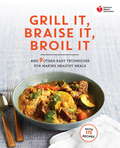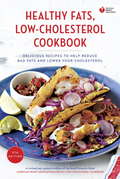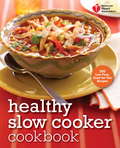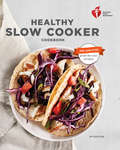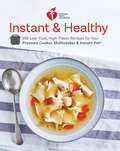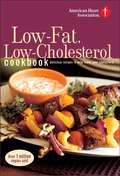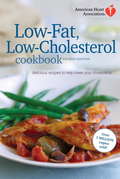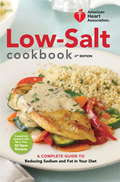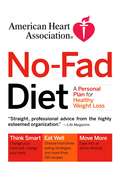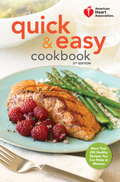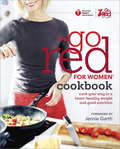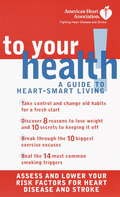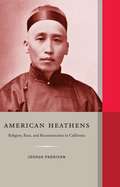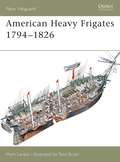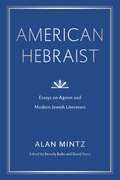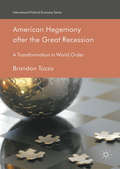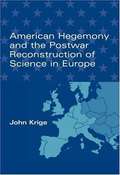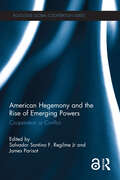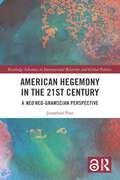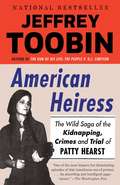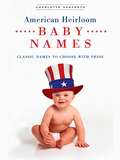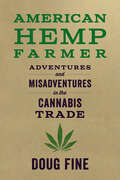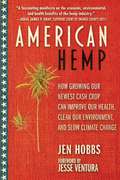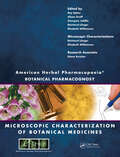- Table View
- List View
American Heart Association Grill It, Braise It, Broil It: And 9 Other Easy Techniques for Making Healthy Meals (American Heart Association)
by American Heart AssociationMaster 12 easy cooking techniques to make 175 heart-healthy recipes for any night, including: slow cooking, grilling, baking, microwaving, blending, stir-frying, steaming, roasting, broiling, poaching, braising, and stewingWhether you're craving bright, summery flavors or a rich meal for a cozy night . . .Whether you have just minutes to cook or a bit of extra time to add some TLC to your dish . . .Whether you want new ideas for your beloved slow cooker or a chance to try out that wok . . .American Heart Association Grill It, Braise It, Broil It is the cookbook for you! A primer on each technique helps you make the most of your oven, stovetop, and favorite appliances, while the 175 recipes expand your repertoire of go-to meals with tons of delicious variety. Try:SLOW COOKING: Madeira Flank Steak * Chicken Cacciatore with Pasta MICROWAVING: Black Bean Chili * Risotto with Edamame BLENDING: Minted Pea Soup with Yogurt Swirl * Peanut Butter and Banana "Ice Cream" GRILLING: Mediterranean Tuna Kebabs * Honey-Balsamic Brussels Sprouts STIR-FRYING: Taco Time Pork * Warm Cinnamon-Raisin Apples BRAISING: Shrimp and Grits with Greens * Pomegranate Pears STEWING: Meatless Cassoulet * Chicken in Tomato-Wine Sauce STEAMING: Thai-Style Chicken Potstickers * Peruvian Quinoa Salad POACHING: Cheesy Open-Face Egg Sandwiches * Cod in Green Curry Broth BROILING: Sweet and Tangy Scallops * Sirloin Steak with Creamy Horseradish Sauce ROASTING: Asparagus with Dijon Vinaigrette * Honeyed Strawberries with Almonds BAKING: Pork Tenderloin Stuffed with Spinach and Sun-Dried Tomatoes * Easy Peach Crisp
American Heart Association Healthy Fats, Low-Cholesterol Cookbook
by American Heart AssociationThe classic cookbook for achieving heart health and wellbeing through a diet that is low in cholesterol and saturated fat--updated and revised with 200 recipes (including 50 new to this edition)Lose the bad fats, but not the flavor.Now in its fifth edition, American Heart Association Healthy Fats, Low-Cholesterol Cookbook provides the most up-to-date information on heart health and nutrition. Good-for-you food should also be satisfying, and the American Heart Association reveals how easy it is to replace the bad fats in your diet with healthier ones. This classic cookbook offers more than 200 tempting dishes, 50 of which are new, including: · Fresh Basil and Kalamata Hummus· Triple-Pepper and White Bean Soup with Rotini· Taco Salad· Hearty Fish Chowder· Chicken Pot Pie with Mashed Potato Topping· Balsamic Braised Beef with Exotic Mushrooms· Grilled Pizza with Grilled Vegetables· Stovetop Scalloped Tomatoes· Puffed Pancake with Apple-Cranberry Sauce· Mango Brûlée with Pine Nuts The perfect companion for today's healthy cook, this indispensable collection of recipes proves you can eat deliciously and nutritiously.
American Heart Association Healthy Slow Cooker Cookbook
by American Heart AssociationStart with healthy ingredients and take delicious meals out of your slow cooker any night of the week. The slow cooker, America's favorite kitchen appliance, has become increasingly versatile and sophisticated, and now it can support a heart-smart diet, too. Under the spell of its low heat, lean meats, whole grains, legumes, vegetables, and fruits transform into succulent meals. From appetizers to desserts and everything in between, the 200 recipes in American Heart Association Healthy Slow Cooker Cookbook will surprise you with their variety and depth of flavor. Braised Curry-Rubbed Chicken slow cooks among Middle Eastern spices, including ginger, cumin, cinnamon, and curry, in a pool of citrus juice and honey. Cioppino with White Wine features a saucy tomato base that simmers until scallops, mussels, and bite-size pieces of mild fish are added to finish this hearty fish stew. Vegetables, beans, and beef stew together to make for a mouthwatering rustic Country Cassoulet, and chopped zucchini, tomato, and basil along with bulgur and provolone cheese are packed into Italian Artichoke-Stuffed Bell Peppers that cook until tender. With some easy planning before or after the slow cooking, such as browning meats or boiling water for pasta, you'll have tasty meals chock full of good nutrition on your kitchen table night after night.This cookbook also includes nineteen full-color photographs as well as information on the benefits of slow cooking and how a slow cooker can help you eat well. The best way to ensure good food comes out of your cooker is to put only good-for-you ingredients into it, and with American Heart Association Healthy Slow Cooker Cookbook, you'll learn how much your slow cooker can do for you while you're enjoying a healthy lifestyle.
American Heart Association Healthy Slow Cooker Cookbook, Second Edition (American Heart Association)
by American Heart AssociationA revised and updated second edition of American Heart Association's beloved, bestselling Healthy Slow Cooker Cookbook, now with 30 new recipes, 30 to 40 new photographs, and full-color throughout.Now fully illustrated throughout with 30 to 40 new photographs, revised to meet current AHA guidelines, and refreshed with recipes like Chicken Pho, Pad Thai, Sweet Potato Chili, and Beef Vindaloo to satisfy today's palate, this comprehensive cookbook offers information on the health benefits of slow cooking and how a slow cooker can help you eat well. From appetizers to desserts and everything in between, the 230 recipes in American Heart Association Healthy Slow Cooker Cookbook will surprise you with their variety and depth of flavor. The slow cooker, America's favorite kitchen appliance, has become increasingly versatile and sophisticated, and here's how it can support a heart-smart diet. Under the spell of its low heat, lean meats, whole grains, legumes, vegetables, and fruits transform into succulent meals. This cookbook takes advantage of the ease for which the slow cooker is beloved and optimizes the nutrient density and flavors in these delicious, nutritious meals.The best way to ensure good food comes out of your cooker is to put only good-for-you ingredients into it, and with American Heart Association Healthy Slow Cooker Cookbook, you'll learn how much your slow cooker can do for you while you're enjoying a healthy lifestyle.
American Heart Association Instant and Healthy: 100 Low-Fuss, High-Flavor Recipes for Your Pressure Cooker, Multicooker and Instant Pot ®
by American Heart AssociationGet healthy in an instant! These 100 recipes show how to use your Instant Pot® to make heart-healthy, fuss-free, delicious meals.The Instant Pot®--a pressure cooker that does the work of seven other appliances--has inspired home cooks with its versatility, speed, and consistently delicious results. And now, the American Heart Association offers the ultimate guide to using your Instant Pot® to support a heart-smart diet. Lean meats, whole grains, legumes, vegetables, and fruits transform into amazing meals in just minutes, and they'll leave you feeling great, too. From appetizers to desserts and everything in between, the 100 recipes in American Heart Association Healthy Instant Pot Cookbook will surprise you with their variety and depth of flavor. This cookbook includes 30-40 full-color photographs as well as easy-to-follow guides to using your Instant Pot® for ultimate health and flavor. The best way to ensure good food comes out of your cooker is to put only good-for-you ingredients into it, and with American Heart Association Healthy Instant Pot Cookbook, you'll learn how much your pot can do for you while you're enjoying a healthy lifestyle.
American Heart Association Low-Fat, Low-Cholesterol Cookbook (3rd edition)
by American Heart AssociationEating well is essential to living well. This becomes ever more apparent as scientists continue to unravel the connection between the food we eat and our health. Choosing healthful food can be complicated, however, especially in a world of fad diets and conflicting reports. This third edition of the American Heart Association low-fat, low-cholesterol cookbook helps you sort through the confusion and gives you information you can trust--plus recipes you will love. Taste and variety abound in this collection of good-for-you recipes. From Smoked Salmon Dip with Cucumber and Herbs to Chocolate Custard Cake with Raspberries, the American Heart Association low-fat, low-cholesterol cookbook offers more than 200 easy-to-prepare dishes--including 50 exciting new recipes. The accompanying nutritional analyses will help you create meals that are sensible, healthful, and absolutely delicious. This bestselling volume is also an invaluable resource for information on heart health. The completely revised text gives you an updated perspective on how diet and exercise contribute to your well-being. It explains how cholesterol affects the body, offers critical facts about good and bad cholesterol, provides tips for preparing heart-healthy foods, and much more. Discover how easy it is to avoid excess saturated fat and cholesterol while enjoying mouthwatering foods. With this book in your kitchen, you can take charge of your diet and love every bite along the way.
American Heart Association Low-Fat, Low-Cholesterol Cookbook, 4th edition
by American Heart AssociationEat wisely, eat well. The nation's most trusted authority on heart-healthy living presents the fourth edition of this classic cookbook, with the most up-to-date information on heart health and nutrition--including the effects of saturated and trans fats and cholesterol--and 50 exciting new recipes.American Heart Association Low-Fat, Low-Cholesterol Cookbook offers more than 200 delicious, easy-to-prepare dishes, including:*Fresh Basil and Kalamata Hummus*Elegant Beef Tenderloin *Tilapia Tacos with Fresh Salsa*Garlic Chicken Fillets in Balsamic Vinegar *Peppery Beef with Blue Cheese Sauce*Thai Coconut Curry with Vegetables*Sweet Potatoes in Creamy Cinnamon Sauce*Pumpkin-Pie Coffeecake*Streusel-Topped Blueberry Bars*Key Lime Tart with Tropical FruitThe perfect companion for today's healthy cook, this indispensable cookbook will help you put delicious food on the table and make the best choices for your heart's health.
American Heart Association Low-Salt Cookbook, 4th Edition
by American Heart AssociationWhether you have heart-health problems now or want to avoid having them in the future, keeping your sodium intake low is one of the best ways to help your heart. In this revised and expanded fourth edition of the American Heart Association Low-Salt Cookbook, the association shows that a low-sodium diet can be not only good for your health but also full of flavor. Including everything from appetizers and soups to entrées and desserts, American Heart Association Low-Salt Cookbook, 4th Edition, offers more than 200 delicious low-sodium recipes--more than 50 of them brand-new to this edition. Whether you are in the mood for a beloved classic or a new favorite, you will find just the dish to please your palate. Looking for a less salty snack? Try Baked Veggie Chips served with Hot and Smoky Chipotle-Garlic Dip. Craving something hearty and full of flavor? Slow-Cooker Moroccan Chicken with Orange Couscous is an ideal low-sodium fix-it-and-forget-it meal. For a Sunday-night family dinner, try Three-Cheese Lasagna with Swiss Chard. And for your sweet tooth? Whip up Peach and Blueberry Cobbler or Rice Pudding with Caramelized Bananas for a special treat. With this book in hand, you'll be armed with nutrition numbers for every recipe and the latest American Heart Association dietary information, as well as the how-tos for avoiding hidden sodium, shopping smart, and using healthy cooking techniques. You'll also find useful resources such as a sodium tracker, a no-sodium seasoning guide, a list of common high-sodium foods, ingredient substitutions, and serving suggestions for each of the food groups.From the Hardcover edition.
American Heart Association Low-Salt Cookbook, 4th Edition: A Complete Guide to Reducing Sodium and Fat in Your Diet
by American Heart AssociationWhether you have heart-health problems now or want to avoid having them in the future, keeping your sodium intake low is one of the best ways to help your heart. In this revised and expanded fourth edition of the American Heart Association Low-Salt Cookbook, the association shows that a low-sodium diet can be not only good for your health but also full of flavor. Including everything from appetizers and soups to entrées and desserts, American Heart Association Low-Salt Cookbook, 4th Edition, offers more than 200 delicious low-sodium recipes--more than 50 of them brand-new to this edition. Whether you are in the mood for a beloved classic or a new favorite, you will find just the dish to please your palate. Looking for a less salty snack? Try Baked Veggie Chips served with Hot and Smoky Chipotle-Garlic Dip. Craving something hearty and full of flavor? Slow-Cooker Moroccan Chicken with Orange Couscous is an ideal low-sodium fix-it-and-forget-it meal. For a Sunday-night family dinner, try Three-Cheese Lasagna with Swiss Chard. And for your sweet tooth? Whip up Peach and Blueberry Cobbler or Rice Pudding with Caramelized Bananas for a special treat. With this book in hand, you'll be armed with nutrition numbers for every recipe and the latest American Heart Association dietary information, as well as the how-tos for avoiding hidden sodium, shopping smart, and using healthy cooking techniques. You'll also find useful resources such as a sodium tracker, a no-sodium seasoning guide, a list of common high-sodium foods, ingredient substitutions, and serving suggestions for each of the food groups.From the Hardcover edition.
American Heart Association No-Fad Diet: A Personal Plan for Healthy Weight Loss (American Heart Association)
by American Heart AssociationBy now, you’ve heard of (and maybe tried) them all: the low-carb diet, the grapefruit diet, the miracle diet . . . the list goes on and on. Fad diets may promise a quick fix, but few deliver lasting results. If you’re like millions of other Americans, you’re still struggling to lose weight and get in shape—without harming your long-term health in the process. It’s time to leave behind the one-size-fits-all approach to dieting. Now, the American Heart Association, the nation’s most trusted authority on heart-healthy living, introduces its first-ever comprehensive weight-loss book. No-Fad Diet helps you create a personalized plan to lose weight in a healthful way. After a simple assessment of your current habits, you choose the eating and exercise strategies that best fit your needs. You’ll learn how to set realistic goals, eat well to lose extra pounds safely, and add physical activity to keep the weight off for good.This book offers more than 190 delicious, all-new recipes, including Cream of Triple-Mushroom Soup, Tilapia Cham-pignon, Chicken Pot Pie, Pumpkin-Cranberry Pancakes, and Vanilla Soufflé with Brandy-Plum Sauce. You’ll also find two weeks of sample menus, guidelines for meal planning, useful tips on dining out and food shopping, and sound advice for staying on track to reach your target weight. If you’re fed up with fads and want a diet that can provide a lifetime of effective weight control, No-Fad Diet is the book for you.Tired of losing weight and gaining it back?Sick of fad diets and gimmicks?Frustrated by crazy food restrictions?Try the No-Fad Diet What’s the only effective way to lose weight and keep it off? It’s simple: Calories in must be less than calories out. But since the factors that contribute to this not-so-magic formula are different for everyone, a one-size diet plan does not fit all. The No-Fad Diet includes:•Tips on turning negative thinking into positive rewards•Simple quizzes to find the approach that’s best for you•Diary pages to record and monitor your eating and activity habits •Strategies to reduce calories and increase your activity levels•Guidelines to help you prepare your own nutritious meals •More than 190 delicious and healthful recipes •Techniques to maintain your momentumThe weight-loss strategies in this book are based on reliable scientific research and are backed by respected medical professionals. The American Heart Association has the information you can trust.Also available as a Random House Large Print Edition
American Heart Association Quick & Easy Cookbook, 2nd Edition
by American Heart AssociationConvenience and eating healthfully can go hand in hand, and with the American Heart Association Quick & Easy Cookbook, 2nd Edition, you can spend less time in the kitchen and still achieve great results at the table. This revised and expanded edition of the classic cookbook includes more than 200 speedy dishes, of which 60 are brand new. Prep and cooking times are provided for all recipes, so you'll know how much time you'll need in the kitchen. And rest assured, no dish takes longer than 20 minutes to prepare, and many recipes can be made in 30 minutes from start to finish. In fewer than 10 minutes, you can start your day with Confetti Scrambler or Mandarin Breakfast Parfaits. No one will guess you whipped up dinner in 20 minutes when you serve Chicken with Tarragon Oil, Baked Tilapia with Pineapple Reduction, or Beef Tenderloin on Herbed White Beans. When meals are this simple and good for you, even appetizers, snacks, sides, and desserts can be on the docket. You'll find recipes for Homemade Corn Tortilla Chips, Edamame Salsa, Warm Chicken and Papaya Salad, Citrus Kale with Dried Cranberries, Chocolate-Banana Mini Cupcakes, Grilled Peaches with Almond Liqueur, and much more! Make the most of your time in the kitchen and in the grocery store with helpful tools such as: · Meal-planning strategies, including a sample dinner plan and a chart template to customize your own meals week-by-week· Guidelines for maximizing nutritious foods and minimizing nutrient-poor foods· Shopping strategies, including lists of health-smart staples· Tips on organizing your kitchen for the greatest efficiency· Quick-cooking techniques and short prep tricksWith this new edition of one of the American Heart Association's first and most popular cookbooks, you'll have a resource right at your fingertips for making your own quick and easy meals that will offer you fast, healthy food.
American Heart Association The Go Red For Women Cookbook
by American Heart Association Jennie GarthA HEALTH COOKBOOK FOR WOMEN BY WOMENThe American Heart Association's Go Red For Women social initiative has inspired hundreds of thousands of women to eat nutritiously, exercise regularly, and maintain a healthy weight. Now the iconic "red dress" can be your kitchen companion all year long, with 200 recipes to help you take charge of your health. By cooking wholesome meals at home, you can easily and significantly reduce your risk of heart disease, which takes the lives of more women each year than all forms of cancer combined. The Go Red For Women Cookbook helps you stick to your health goals with recipes for guilt-free drinks, appetizers, dinners, and desserts for gatherings with friends and breakfasts on the go, brown-bag lunches, and snacks for the whole family. Recipes include: · Vegetable-Shrimp Spring Rolls with Honey-Jalapeño Sauce · Chipotle Tomato Soup · Spinach Salad with Apples and Caramelized Radishes · Kale Salad with Sweet Citrus Dressing · Lime-Basil Tilapia · Jerk Chicken with Mango-Avocado Salsa · Portobello Ragout with Sun-Dried Tomato Polenta · Garlicky Greek Salad Pizza · Sangría-Style Punch · Lemon Mini Cheesecakes · Red Velvet Cake Pops A necessary primer on good nutrition, weight control, and smart grocery shopping as well as how to live and enjoy a healthy lifestyle while helping to prevent heart disease, The Go Red For Women Cookbook makes it easy for you to adopt healthy eating habits.From the Hardcover edition.
American Heart Association To Your Health!: A Guide to Heart-Smart Living (American Heart Association)
by American Heart AssociationWhether you're a couch potato, diet dropout, or heavy smoker, it's hard to change old habits. But with this step-by-step guide, you can do it!You'll learn how to set realistic goals and follow through on them, plus stick to your new healthful habits. Stories of how other real people overcame the same hurdles will motivate you.* Find physical activities that are fun for you. Reward yourself in healthful ways for your fitness achievements.* Create a personalized eating plan that you can really live with*Learn how to identify your most common smoking triggers. Discover ways to beat those urges and kick the habit for good.* Find out how to get reliable information and become proactive about your health.This friendly little book is filled with tips and can help you change for the better. You'll take charge of your health and celebrate again and again. To your Health!
American Heathens: Religion, Race and Reconstruction in California
by Joshua PaddisonIn the 19th-century debate over whether the United States should be an explicitly Christian nation, California emerged as a central battleground. Racial groups that were perceived as godless and uncivilized were excluded from suffrage, and evangelism among Indians and the Chinese was seen as a politically incendiary act. Joshua Paddison sheds light on Reconstruction’s impact on Indians and Asian Americans by illustrating how marginalized groups fought for a political voice, refuting racist assumptions with their lives, words, and faith. Reconstruction, he argues, was not merely a remaking of the South, but rather a multiracial and multiregional process of reimagining the nation.
American Heavy Frigates 1794-1826
by Mark LardasBy 1805 the 44-gun frigate was probably viewed as a failed experiment whilst the 38-gun frigate was viewed as the vessel of the future. Ten years later every navy was building 44-gun frigates and today it is viewed as the symbol of the Napoleonic-era cruiser. This remarkable transformation resulted from the performance of three ships – the Constitution, United States, and President – 44-gun frigates built for the United States Navy between 1794 and 1799. Their victories in the naval War of 1812, as well as their performance against the Barbary Pirates, caught the imagination of the world – and spurred all navies into re-examining the class.
American Hebraist: Essays on Agnon and Modern Jewish Literature (Dimyonot)
by Alan MintzAlan Mintz (1947–2017) was a singular figure in the American Jewish literary landscape. In addition to publishing six authoritative books and numerous journal articles on modern and contemporary Jewish culture, Mintz contributed countless reviews and essays to literary journals, including the New Republic, the New York Times Book Review, and the Jewish Review of Books. Scattered in miscellaneous volumes and publications, these writings reveal aspects of Mintz’s scholarly personality that are not evident in his monographs.American Hebraist collects fifteen of Mintz’s most insightful articles and essays. The topics range from the life and work of Nobel Prize winner S. Y. Agnon—including a chapter from Mintz’s unfinished literary biography of that author—to Jewish and Israeli literature, the Holocaust, and a rare autobiographical essay. The chapters are introduced and contextualized by Mintz’s longtime colleague and friend David Stern, who opens the book by tracing the arc of Mintz’s intellectual career; the volume concludes with a personal essay and remembrance written by Beverly Bailis, the last student to complete a doctorate under Mintz’s direction.Brimming with erudition and intriguing biographical notes, American Hebraist provides new insights into the life and work of one of the twentieth century’s most important scholars of modern Hebrew literature. Students and scholars alike will benefit from this essential companion to Mintz’s scholarship.
American Hegemony after the Great Recession: A Transformation in World Order (International Political Economy Series)
by Brandon TozzoThis book traces America's rise as a hegemon of the capitalist system, arguing that the greatest threat to global economic stability is America's polarized and ineffectual political system rather than foreign competition from China and the European Union. The author points to China's considerable demographic problem, which will likely undermine its economic potential. Furthermore, the sovereign debt crisis in Europe - which has left the continent politically fragmented by an institutional malaise - is evidence of the United States' continued status as the world's most successful nation. Tozzo posits that, due to factors such as its initial response to the financial crisis, the near failure of its banking system, the catastrophe of the debt ceiling crisis, and the election of Donald Trump as president, the greatest threat to American hegemony is America itself.
American Hegemony and the Postwar Reconstruction of Science in Europe
by John KrigeIn 1945, the United States was not only the strongest economic and military power in the world; it was also the world's leader in science and technology.
American Hegemony and the Rise of Emerging Powers: Cooperation or Conflict (ISSN)
by James Parisot Salvador Santino F. RegilmeOver the last decade, the United States' position as the world's most powerful state has appeared increasingly unstable. The US invasions of Afghanistan and Iraq, non-traditional security threats, global economic instability, the apparent spread of authoritarianism and illiberal politics, together with the rise of emerging powers from the Global South have led many to predict the end of Western dominance on the global stage. This book brings together scholars from international relations, economics, history, sociology and area studies to debate the future of US leadership in the international system. The book analyses the past, present and future of US hegemony in key regions in the Asia-Pacific, Latin America, Middle East, Europe and Africa – while also examining the dynamic interactions of US hegemony with other established, rising and re-emerging powers such as Russia, China, Japan, India, Turkey and South Africa.American Hegemony and the Rise of Emerging Powers explores how changes in the patterns of cooperation and conflict among states, regional actors and transnational non-state actors have affected the rise of emerging global powers and the suggested decline of US leadership. Scholars, students and policy practitioners who are interested in the future of the US-led international system, the rise of emerging powers from the Global South and related global policy challenges will find this multidisciplinary volume an invaluable guide to the shifting position of American hegemony.The Open Access version of this book, available at http://www.taylorfrancis.com, has been made available under a Creative Commons Attribution-Non Commercial-No Derivatives (CC-BY-ND) 4.0 license.
American Hegemony in the 21st Century: A Neo Neo-Gramscian Perspective (Routledge Advances in International Relations and Global Politics)
by Jonathan PassFor many years now debates over America hegemony and its supposed decline have circulated academic circles. The neo-Gramscians have greatly enriched our knowledge in this field, developing some key theoretical tools and concepts, yet ontological inconsistencies, notably the downgrading of structure, has meant their explanation of the dynamics of the contemporary world order remains somewhat incomplete. In this book, Jonathan Pass aims to counter such oversights, drawing directly on the ideas of Antonio Gramsci (amongst others) to elaborate a more sophisticated, overtly materialist, theory of world hegemony, rooted in a critical realist philosophy of science. Through the lens of this Neo neo-Gramscian (NNG) approach the book examines the complex interplay of internal and external social forces responsible for the evolving 'nature' of US hegemony, from its establishment in the 1940s, passing through its different stages of crisis and restructuring up to the present. China's spectacular rise undoubtedly constitutes a 'world event', but is it potentially a 'world hegemon'? The book seeks to sheds some light on this question, analysing the economic and geopolitical significance of China's emergence and how it affects, and is affected by, both American hegemony and its own extremely delicate 'passive revolution' at home. American Hegemony in the 21st Century presents a major contribution to International Relations, International, Political Economy, Politics and Philosophy and will be of interest to researchers looking for a more sophisticated and convincing analysis of the dynamics of the contemporary world order.
American Heiress: The Wild Saga of the Kidnapping, Crimes and Trial of Patty Hearst
by Jeffrey Toobin<P>From New Yorker staff writer and bestselling author of The Nine and The Run of His Life: The People v. O. J. Simpson, the definitive account of the kidnapping and trial that defined an insane era in American history <P>On February 4, 1974, Patty Hearst, a sophomore in college and heiress to the Hearst family fortune, was kidnapped by a ragtag group of self-styled revolutionaries calling itself the Symbionese Liberation Army. The already sensational story took the first of many incredible twists on April 3, when the group released a tape of Patty saying she had joined the SLA and had adopted the nom de guerre "Tania." <P>The weird turns of the tale are truly astonishing--the Hearst family trying to secure Patty's release by feeding all the people of Oakland and San Francisco for free; the bank security cameras capturing "Tania" wielding a machine gun during a robbery; a cast of characters including everyone from Bill Walton to the Black Panthers to Ronald Reagan to F. Lee Bailey; the largest police shoot-out in American history; the first breaking news event to be broadcast live on television stations across the country; Patty's year on the lam, running from authorities; and her circuslike trial, filled with theatrical courtroom confrontations and a dramatic last-minute reversal, after which the term "Stockholm syndrome" entered the lexicon. <P>The saga of Patty Hearst highlighted a decade in which America seemed to be suffering a collective nervous breakdown. Based on more than a hundred interviews and thousands of previously secret documents, American Heiress thrillingly recounts the craziness of the times (there were an average of 1,500 terrorist bombings a year in the early 1970s). <P>Toobin portrays the lunacy of the half-baked radicals of the SLA and the toxic mix of sex, politics, and violence that swept up Patty Hearst and re-creates her melodramatic trial. American Heiress examines the life of a young woman who suffered an unimaginable trauma and then made the stunning decision to join her captors' crusade. <P> Or did she? <P><b>A New York Times Bestseller</b>
American Heirloom: Baby Names
by Charlotte DanforthOver 1,500 timeless American names for today's baby. Appealing and timeless, the names in this book are gathered from the pages of our history books and rooted in the nation's heartland. They are the names of real-life American poets and soldiers, artists and pioneers, entrepreneurs, teachers, and athletes. Distinctive and prestigious names can give children instant, natural role models-the heroes and positive idols who have had their names before. Entries in this unique guide include: - Classic names and descriptions of the heroic Americans who bore them - References to writings by and about each namesake that families can enjoy together - Historic sites related to each heirloom name suitable for family field trips - Famous names in all ethnic groups - The greatest names in medicine, law, statecraft, sports, business, philanthropy, exploration, invention, and more - Print features and reviews
American Hemp Farmer: Adventures and Misadventures in the Cannabis Trade
by Doug FineThe inside story of the world&’s most fascinating and lucrative crop from gonzo journalist–turned–hemp farmer Doug Fine.Hemp, the non-psychoactive variant of cannabis (or marijuana) and one of humanity&’s oldest plant allies, has quietly become the fastest industry ever to generate a billion dollars of annual revenue in North America. From hemp seed to hemp fiber to the currently ubiquitous cannabinoid CBD, this resilient crop is leading the way toward a new, regenerative economy that contributes to soil and climate restoration—but only if we do it right.In American Hemp Farmer, maverick journalist and solar-powered goat herder Doug Fine gets his hands dirty with healthy soil and sticky with terpenes growing his own crop and creating his own hemp products. Fine shares his adventures and misadventures as an independent, regenerative farmer and entrepreneur, all while laying out a vision for how hemp can help right the wrongs of twentieth-century agriculture, and how you can be a part of it.
American Hemp: How Growing Our Newest Cash Crop Can Improve Our Health, Clean Our Environment, and Slow Climate Change
by Jen HobbsIf there ever was a time to build an American hemp industry, the time is now.In Jesse Ventura’s Marijuana Manifesto, former Minnesota Governor teamed up with Jen Hobbs to explain why it’s time to fully legalize cannabis and end the War on Drugs. Through their research, it became clear that hemp needed its own manifesto. Jen Hobbs takes up this torch in American Hemp.December of 2018 marked a largely unprecedented victory for cannabis. The 2018 Farm Bill passed and with it hemp became legal. What the federal government listed for decades as a schedule 1 narcotic was finally classified as an agricultural crop, giving great promise to the rise of a new American hemp industry. Filled with catchall research, American Hemp examines what this new domestic crop can be used for, what makes it a superior product, and what made it illegal in the first place; the book also delves into the many health and medical benefits of the plant. Hobbs weighs in on how hemp can improve existing industries, from farming to energy to 3D printing, plus how it can make a serious impact on climate change by removing toxins from the soil and by decreasing our dependence on plastics and fossil fuels.American Hemp lays out where we are as a nation on expanding this entirely new (yet ancient) domestic industry while optimistically reasoning that by sowing hemp, we can grow a better future and save the planet in the process.
American Herbal Pharmacopoeia: Botanical Pharmacognosy - Microscopic Characterization of Botanical Medicines
by Elizabeth Williamson Roy Upton Alison Graff Georgina Jolliffe Reinhard LängerWinner of the James A. Duke Award for Excellence in Botanical Literature Award from the American Botanical CouncilCompiled by the American Herbal Pharmacopoeia, this volume addresses the lack of authoritative microscopic descriptions of those medicinal plant species currently in trade. It includes an atlas providing detailed text and graphic descri
